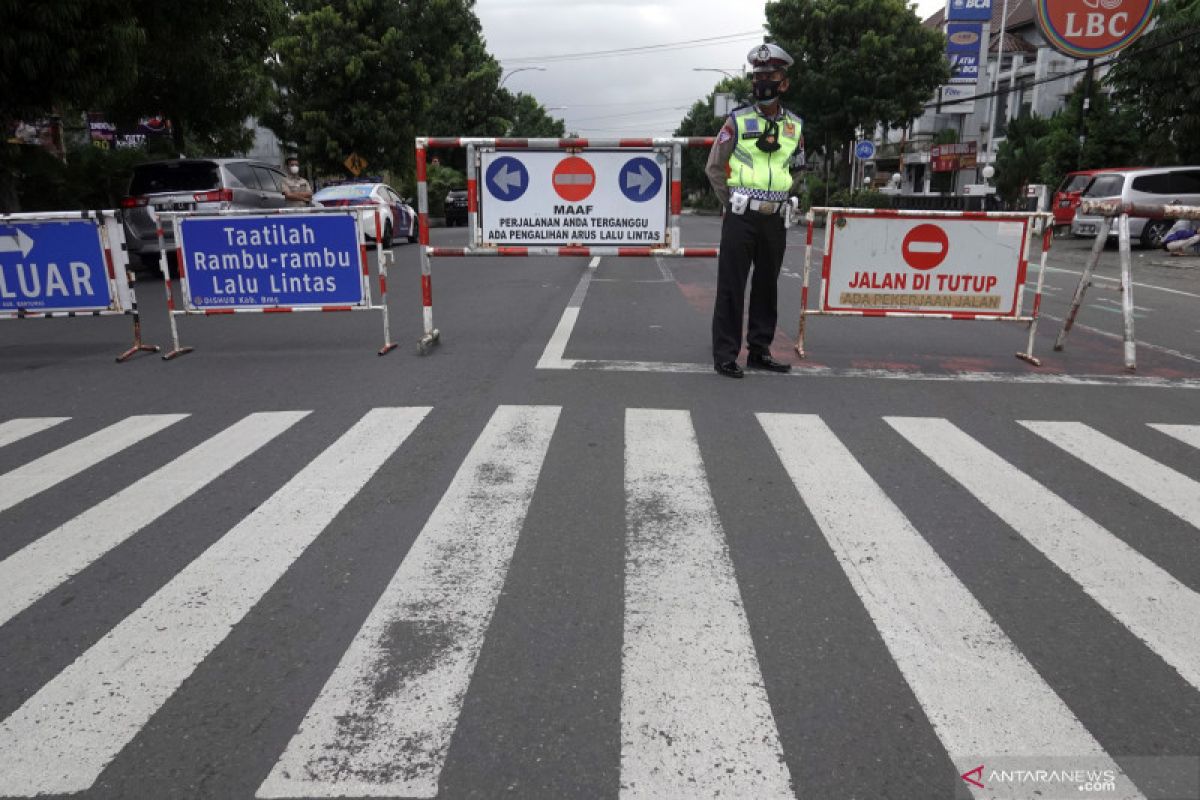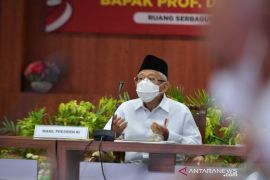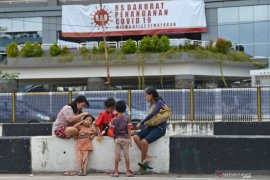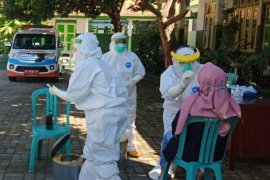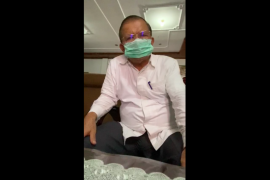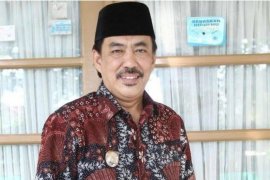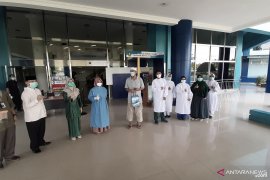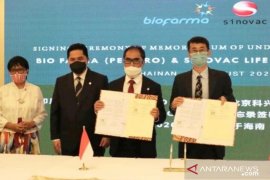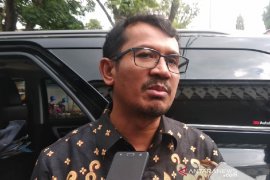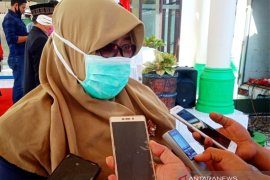President Joko Widodo (Jokowi) has urged the public to stay calm during the implementation of the emergency restrictions.
He has also called on the public to remain disciplined in adhering to the health protocols and support the work of government officials and volunteers handling the COVID-19 pandemic.
"I call on the public to remain calm and alert to comply with existing regulations," Widodo said.
“With sound cooperation from every individual and the will of Allah SWT, Indonesia can suppress the spread of COVID-19 and restore people's lives quickly,” the President added.
The emergency people's activity restrictions (PPKM), which will be in place till July 20, 2021, are aimed at reducing daily coronavirus infections to below 10 thousand. They entail a work-from-home guidance for all non-essential sectors and the continued closure of schools and universities.
During the emergency restrictions, public amenities like beaches, parks, tourist attractions, and places of worship will remain closed, while restaurants will be allowed to only offer take-away or delivery services.
Related news: Emergency PPKM imposed for overall public safety: spokesperson
On Saturday, the first day of the imposition of the emergency restrictions, the main roads of Jakarta, such as Sudirman and Thamrin avenues, bore a deserted look as police installed barricades at several toll roads and intersection points on main roads to limit the mobility of residents. Only individuals working in the essential sector are allowed to venture outside the home.
Practically quarantining the capital city by significantly limiting those wanting to go out or enter the capital city, Jakarta Police, supported by military personnel, implemented isolation measures at 63 entry and exit points for Jakarta, Depok, Tangerang, and Bekasi (Jadetabek).
Overall, the first day of imposition of emergency community activity restrictions (PPKM) in Java and Bali went smoothly, officials said.
Indonesia saw a record increase in daily COVID-19 cases on July 3, 2021, with 27,913 new infections and 493 deaths reported across the country. The number of single-day recoveries stood at 13,282, while active cases were pegged at 281,677.
Since the government announced the first COVID-19 cases on March 2, 2020, the tally of infections has so far reached 2,256,851, while the death toll has touched 60,027.
Indonesia's current COVID situation has raised concern owing to the drastic spike in infections, officials said adding, the unusual condition requires extraordinary measures. Coronavirus transmission needs to be controlled, they said.
"Remember, this emergency PPKM action is to save lives. The President's orders are clear. We are taking more decisive and measurable steps," Jodi Mahardi, spokesperson for the Coordinating Minister for Maritime Affairs and Investment, said in a press statement broadcast by the Presidential Secretariat's Youtube account.
Related news: Govt to raise hospital bed capacity by 30% amid COVID surge
The hospital bed occupancy rate on Java Island, including in Jakarta, has currently crossed 90 percent. Quite a few health facilities are full, which has forced many to accommodate patients in the aisles or even, reject patients and advise them to conduct self-isolation at home.
Doctors, nurses, and other healthcare workers have said they are exhausted and so have graveyard diggers. As of June 27, 2021, 405 Indonesian doctors have succumbed to COVID-19, according to data from the Indonesian Medical Association (IDI).
Last June, at least 336 healthcare workers in Bogor, West Java had contracted COVID-19 and fallen ill, leading to the Bogor municipality taking the decision to shut down eight health facilities.
According to Health Minister Budi Gunadi Sadikin, the government has adopted three strategies to deal with the pandemic.
The three strategies are adjusting behavior to emergency PPKM; detecting suspected patients through testing, tracing, and treatment (3T) activities; and, accelerating COVID-19 vaccinations.
Adjusting behavior to emergency PPKM encompasses wearing face masks, washing hands with soap, and maintaining a safe physical distance.
The government will step up testing and tracing activities by up to four times from now onwards — the same way as other countries recording a surge in COVID-19 active cases, Sadikin said. To that end, it will ramp up tests to 400 thousand-500 thousand samples per day from 100 thousand samples per day earlier, he disclosed.
If the positivity rate is less than five percent, then only one out of every one thousand citizens will be tested per week, he informed. If the positivity rate is above five percent and less than 15 percent, then the minimum test ratio will be five out of every one thousand citizens per week, he added.
If the positivity rate is above 15 percent and less than 25 percent, then 10 out of every one thousand citizens will be tested per week, the minister said. If the positivity rate is above 25 percent, then 15 out of every one thousand citizens will be tested per week, he added.
Meanwhile, the executive board of IDI has prepared a number of schemes for strengthening human resources (HR) to optimize the handling of COVID-19.
"The first scheme that has been prepared is for general practitioners who have completed their internship. They could be prepared to assist in health services," Adib Khumaidi, head of the PB IDI's Doctor Mitigation Team, said at an online press conference on July 2, 2021.
Another scheme involves deploying medical students who have passed and received a doctor's professional competency test certification, he added.
The IDI is still awaiting approval from the Health Ministry to implement such a conversion scheme. The association also said it will deploy volunteers in areas that need health workers for handling COVID-19 later on.
Related news: COVID-19 Task Force requires thousand other medical volunteers
Indonesia has been carrying out a national vaccination program, which has been prioritizing healthcare workers, including doctors and nurses, since January 13, 2021. The program has mostly used CoronaVac vaccines developed by Sinovac of China.
As many as 152,625 Indonesians received their second dose of the COVID-19 vaccine on July 3, 2021, bringing the count of fully vaccinated people to 13,922,732. Meanwhile, the number of people receiving their first COVID-19 dose rose by 681,419 to reach 31,573,240. (INE)
Related news: Over 13.92 million Indonesians fully vaccinated against COVID-19
Related News: Indonesia moves to protect children as COVID-19 cases spike
EDITED BY INE
Editor: Suharto
Copyright © ANTARA 2021
